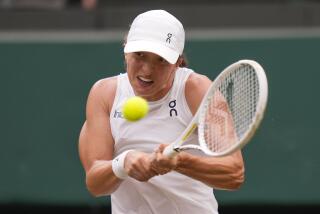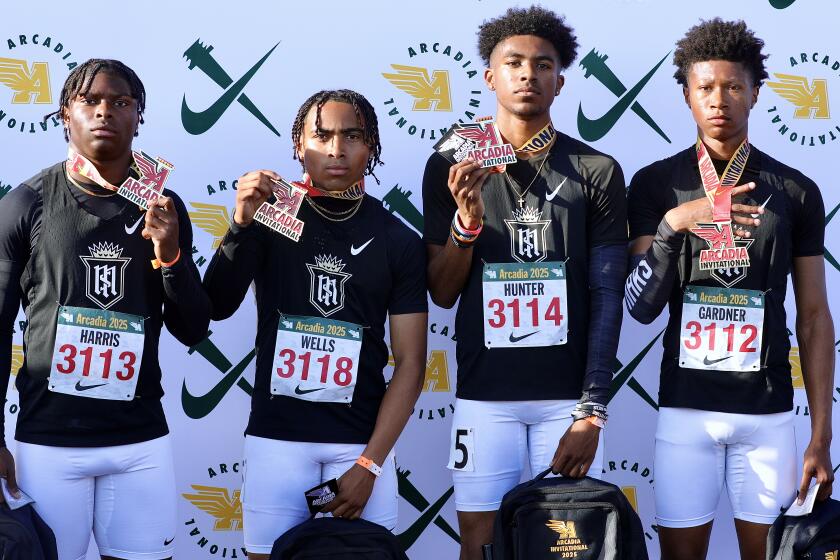No Term Limits for Sampras Now
- Share via
NEW YORK — That Pete Sampras lost in the second round of a tuneup tournament on Long Island last month wasn’t the primary issue. What he said afterward was.
“You have to remember who I am and where I’m playing next week,” he said after a three-set loss to Frenchman Paul-Henri Mathieu. “The U.S. Open is where you shine and that is where I hope to shine. I’m not the man to beat, like I once was--Lleyton Hewitt has taken that role--but I’m still one of the favorites. The fear factor is still there in the majors, although maybe not as much as it used to be.”
Frankly, it seemed sad at the time. Many read those comments and wondered if Sampras didn’t seem a tad deluded. Fear factor? His tournament drought had hit double digits, 33. Once, numbers that high identified with Sampras usually dealt with aces.
Still, Sampras had done too much, and suffered too much, in 2002, and the words passed without commentary. Why pile on when Yevgeny Kafelnikov had already publicly voiced what other players were saying quietly, that Sampras should consider retiring?
The beauty of sport, though--as well as life--is its crazy bounces. On Sunday, one player was left standing at the U.S. Open, Sampras. His greatest rival, Andre Agassi, was dispatched in a stirring four-set final.
The so-called “New Balls” kids--let’s put that gimmick in mothballs, please--were long gone. Tommy Haas, in the fourth round, and Andy Roddick, in the quarterfinals, both had been taken out by
As for the critics? Greg Rusedski, the man whose left foot ended up in his mouth when he suggested that Sampras had lost a step, made it to the second week only because of rain delays, and was dismissed in the third round last Monday by ... Sampras. Kafelnikov didn’t even make it through the first week.
Sampras might have sounded like a tennis orphan with his brave words in Long Island. Funny how he turned into a tennis oracle one tournament later.
And so, Sampras the seer was keeping the world off balance about his future in the moments after perhaps his greatest achievement, his fifth U.S. Open title and 14th Grand Slam singles championship.
The victory will allow him the luxury of taking his next step on his own terms. Going out on top is something of an American obsession, really, and Sampras, should he choose to go that route, scripted it perfectly, beating his all-time rival Agassi under the lights of Arthur Ashe Stadium, hitting 33 aces.
There is no hard-and-fast script, though. Agassi’s wife Steffi Graf won her final and most unexpected Grand Slam, the 1999 French Open, after an emotional, injury-riddled journey. Graf could have stopped then, but went on to reach the Wimbledon final in July and retired later that summer.
Losing in the final at Wimbledon did nothing to diminish her storybook French Open victory, and an early or late Sampras loss next year at Wimbledon would not detract from his U.S. Open accomplishment.
Had Sampras thought about who his final opponent at Wimbledon might be?
“You can’t predict these things,” he said. “[It will be] whoever it is. I mean, I don’t know. You wanted a storybook ending, but hopefully, my last Wimbledon will be on Center Court and not Court 12 or 2.”
And not against George Bastl, who beat him in the second round this year on Court 2. That was Sampras’ low point, and the resulting negativity started to settle into his psyche.
“I wanted to stop on my own terms,” he said Sunday after his 6-3, 6-4, 5-7, 6-4 victory over Agassi. “That was the one thing I promised myself, even though I was struggling this year and hearing this and that.
“I’ve done too much in the game to hear the negative things and start believing it because there was a point I was believing it, maybe this time.
“Having my family, my wife, just kind of kept me going and [Coach Paul Annacone] just kept me positive, and that was huge for me.
“I could step away from the game and feel really good about what I’d done,” Sampras said of his attitude before the Open. “But I still felt like I had one more moment, maybe a couple more moments. And it happened today.”
Perhaps the solution would be for him to play a drastically reduced schedule, retire from the full-time grind of the tour, and focus on selected Grand Slams.
“I don’t think he puts the same effort and the same performance in at a regular tournament,” said the retired Boris Becker. “I think if he would play eight Slams a year, he’d make four finals and maybe win one or two.”
There is no large looming figure dominating the game, week in and week out. There were four winners at the four Slams this year. Thomas Johansson won the Australian Open, Albert Costa the French Open, Hewitt won at Wimbledon and Sampras here.
The German legend, Becker, talked about the boost Agassi and Sampras gave the sport at the Open.
“All the talk the last couple of weeks [about] whether they’re finished or not, I think they’ve proven a point here,” he said. “Hopefully you’ll see more of Pete and Andre for the next 12 months because this is what tennis is all about.
“You see Lleyton Hewitt, the current No. 1 against the former No. 1s. This is what tennis needs, to see a comeback from Pete. We don’t need to explain how much he’d won. It’s good for tennis altogether.”
More to Read
Go beyond the scoreboard
Get the latest on L.A.'s teams in the daily Sports Report newsletter.
You may occasionally receive promotional content from the Los Angeles Times.











